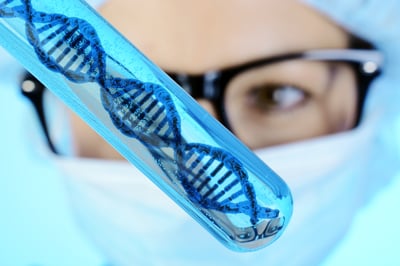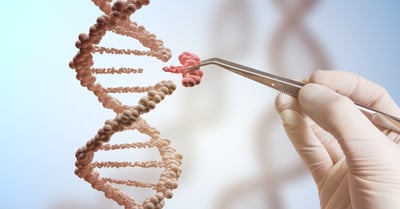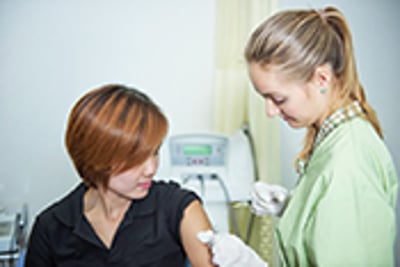FORCE's eXamining the Relevance of Articles for You (XRAY) program looks behind the headlines of cancer news to help you understand what the research means for you.
XRAY is a reliable source of hereditary cancer research-related news and information.
Learn more about the XRAY program
Categories Genetic Testing
Update : FDA approves at-home test kits for inherited cancer: how useful are they?
Most relevant for: People who are considering or have had direct-to-consumer testing through 23andMe
Genetic testing for health conditions (such as risk for cancer) typically requires a prescription from a doctor. Until recently, direct-to-consumer (DTC) genetic testing has focused on tests to learn your ancestry and find of unknown branches of family trees. A laboratory called 23andMe that provides direct-to-consumer genetic testing has been given FDA approval to report results for 3 mutations found in the BRCA1 and BRCA2 genes. The FDA statement provides details about this approval and warns people about the limitations of the 23andMe test. (03/19/18)
Read More
Relevance: Medium-High


Quality of Writing: Medium


Article : Insurance companies are more than curious about your genetic test results
Relevance: Medium-High


Quality of Writing: Medium


Most relevant for: People considering testing for an inherited gene mutation
An article on CBSNews.com addressed why insurance companies, particularly long-term insurance companies, might want to know which of their policy holders and potential policy holders have a gene that raises their risk for cancer. The article discusses genetic discrimination by insurance companies that provide long term care policies. Federal laws protect people with gene mutations from discrimination in health insurance. No such federal laws exist for life insurance, disability insurance or long term care. (3/13/18)
Read More
Study : Survival and mutation status in breast cancer patients under age 40
Most relevant for: Young breast cancer patients
Studies have found conflicting rates of survival for BRCA mutation carriers who develop breast cancer, reporting better, worse and similar outcomes compared to patients with sporadic breast cancer. New results of the large Prospective Outcomes in Sporadic versus Hereditary (POSH) breast cancer study found no difference in survival rates between the two groups. The study also concluded that among young triple-negative breast cancer patients during the first 2 years after diagnosis, BRCA mutation carriers had an initial survival advantage compared to women without a BRCA mutation. (02/15/18)

Relevance: Medium-Low


Strength of Science: Medium-Low


Research Timeline: Human Research


Study : No new high-risk breast cancer genes here
Relevance: Medium-Low


Strength of Science: Medium-Low


Research Timeline: Human Research


Most relevant for: People with a family history of breast cancer but no known inherited mutation
While some of the genes that cause hereditary breast cancer are known (for example, inherited mutations in genes like BRCA, ATM and PALB2), others remain unidentified. Two studies found 72 DNA changes (also known as “variants” or “SNPs”) that affect breast cancer risk. These variants are different from mutations in genes that dramatically increase cancer risk. Most of these new variants are located outside of the portion of DNA that is used to make proteins. Further research is needed on these new variants before they can be used by doctors to help people understand and manage their risk for cancer. (1/12/18)
Read More
Relevance: Medium-High


Strength of Science: Medium-High


Research Timeline: Post Approval


Study : Genetic counseling by phone or face-to-face
Relevance: Medium-High


Strength of Science: Medium-High


Research Timeline: Post Approval


Most relevant for: People referred to a genetic counselor or those considering genetic testing
Results presented at the 2017 American Psychological Association’s annual meeting showed genetic counseling by telephone is as “safe and effective” in long-term psychological and social outcomes compared to traditional in-person counseling for women at risk for hereditary breast and ovarian cancer. This presentation is an update on research published in 2014. (11/29/17)
Read More
Article : Preimplantation genetic diagnosis and hereditary cancer
Most relevant for: people with an inherited mutation linked to cancer risk
Andrew Joseph’s piece for STAT, “A baby with a disease gene or no baby at all: Genetic testing of embryos creates an ethical morass,” focuses on preimplantation genetic diagnosis (PGD) and the emerging ethical issue in the field of reproductive medicine: What to do when patients seeking to get pregnant select embryos with DNA that could lead to a disease or a disability. (11/8/17)
Read More
Article : Mixed reviews of at-home genetic testing
Most relevant for: People who are considering or have had direct-to-consumer testing
National guidelines recommend that patients meet with a genetics expert before undergoing genetic testing for cancer risk. Genetic counseling can help patients decide whether genetic testing is right for them and order the most appropriate test. Once test results are available, genetics experts also help patients understand their results. Over the last decade, the popularity of direct-to-consumer (DTC) genetic testing, such as 23andMe has grown. Some genetic tests are marketed to consumers on television, in print advertisements, and on the Internet. These “at-home” genetic tests give people direct access to their genetic information without first involving a healthcare provider in the process. A recent report outlines the benefits and limitations of DTC genetic testing. (10/20/17)
Read More
Relevance: Medium-High


Strength of Science: Medium-High


Research Timeline: Post Approval


Study : Does expanded genetic testing benefit Jewish women diagnosed with breast cancer?
Relevance: Medium-High


Strength of Science: Medium-High


Research Timeline: Post Approval


Most relevant for: Jewish women with breast cancer who previously tested negative for the three most common BRCA mutations
BRCA1 and BRCA2 mutations are common in people of Eastern European (Ashkenazi) Jewish descent. About 2% of all Ashkenazi Jewish people will test positive for one of three common mutations in these genes. Genetic testing for Jewish people sometimes focuses on only the three most common mutations. For Jewish women with breast cancer, little is known about their chance of carrying a different hereditary mutation that may increase risk. This study looked at expanded genetic testing in Jewish women diagnosed with breast cancer to learn how often they carried mutations other than the three most common BRCA gene mutations found in Ashkenazi Jewish people. (09/13/17)
Read More
Relevance: Medium-High


Quality of Writing: High


Article : Parents face challenges when deciding the best time to tell children that they may be at high risk for cancer
Relevance: Medium-High


Quality of Writing: High


Most relevant for: Parents who have an inherited gene mutation
When certain types of cancers run in families, genetic testing can determine whether the cause is hereditary. Genetic testing can help family members understand their cancer risk and make medical decisions to stay healthy. A test result can provide significant insight, but it also creates challenges for parents, because gene mutations that cause hereditary cancers can be passed from mothers and fathers to sons and daughters. People with these mutations must make difficult decisions about when to tell their children that they too may have inherited the mutation. (8/22/2017)
Read More
Relevance: Medium-Low


Strength of Science: Medium-Low


Research Timeline: Animal Studies


Article : Report on vaccines to prevent hereditary cancer
Relevance: Medium-Low


Strength of Science: Medium-Low


Research Timeline: Animal Studies


Most relevant for: High risk women who have not had breast cancer
On 05/30/2017, Good Morning America aired a segment entitled “Can a vaccine help prevent breast cancer at its earliest stages?” The story outlines the need for cancer prevention and hints at early research into a cancer vaccine. (8/1/17)
Read More